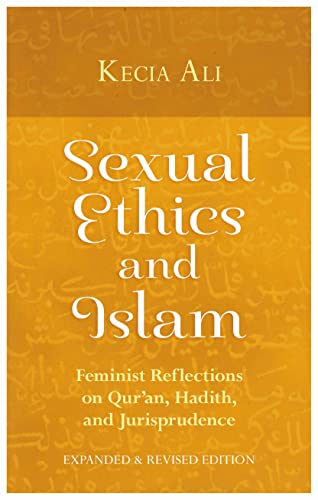Sexual Ethics and Islam
Feminist Reflections on Qur'an, Hadith, and Jurisprudence
Kecia Ali
BOOK REVIEW

In the intricate dance of faith, culture, and identity, Sexual Ethics and Islam: Feminist Reflections on Qur'an, Hadith, and Jurisprudence by Kecia Ali emerges as a resounding, clarion call. This book is not a mere academic study; it is a revolutionary manifesto that challenges entrenched narratives and opens the door to a profound conversation about women's rights and sexual ethics within the Islamic framework.
Kecia Ali, a trailblazer in Islamic feminism, confronts the guardians of traditionalism by examining sacred texts through a feminist lens, revealing the rich tapestry of thought and interpretation that exists within Islam. Her work invites readers-Muslims and non-Muslims alike-to engage with the Qur'an and Hadith in a way that honors the complexity of women's experiences. She posits that these texts do not inherently oppress; instead, cultural practices and interpretations have often distorted their true essence.
The book is structured into several key themes, each unraveling the often-unspoken intersections of faith and gender. Ali delves deep into the historical context of Islamic jurisprudence, tracing its evolution and the patriarchal structures that have shaped it over centuries. With surgical precision, she dissects how interpretations can favor the status quo while simultaneously illuminating pathways for empowerment and justice.
Readers are compelled to reflect on the impact of their own biases as Ali skillfully weaves in personal narratives, contrasting them with scholarly critiques. One poignant moment recalls a young Muslim woman who internalized shame and guilt due to conventional teachings on sexuality. Her story is a mirror reflecting the broader struggles faced by women who yearn for agency yet grapple with centuries of misinterpretation. This is not simply an academic text but a profound examination of identity, spirituality, and the quest for autonomy.
The reactions to Ali's work have been as varied as the themes she explores. Some readers laud her bravery in addressing taboo subjects within the Muslim community, celebrating her as a voice of reason and humanity. They find solace and empowerment in her words, which resonate deeply in an age of burgeoning movements for gender equality. Others, however, react defensively. Critics argue that her interpretations may blur the lines of doctrine and tradition, expressing concern that such radical shifts could undermine the faith. Yet, imposing silence on these discussions only perpetuates the cycle of oppression.
By navigating these contentious waters, Ali challenges scholars and laypeople alike to reconsider their understanding of Islamic teachings on sexuality and ethics. The book demands engagement with uncomfortable truths while also offering a glimmer of hope for reform and liberation. The narratives of women rising to reclaim their voices in the name of faith are nothing short of revolutionary, igniting the flame of a much-needed discourse on rights, identity, and spirituality.
This book arrives at a significant moment in history when movements across the globe are questioning age-old inequalities and advocating for justice. Through Ali's insights, we are reminded that the journey towards a balanced and equitable understanding of sexual ethics is not limited to a single community or tradition but resonates universally. The implications of her scholarship extend far beyond the confines of religion, touching on themes of empowerment, resistance, and the reclamation of agency.
As you immerse yourself in Sexual Ethics and Islam, be prepared for a journey that may challenge your perceptions and spark a flame of curiosity within you. The emotions laid bare within its pages-from rage at injustices to joy in the recognition of power and identity-will leave you contemplating the profound effects of reclaiming one's narrative. Every chapter echoes a call to action, urging readers to not only reflect on their beliefs but also to advocate for the women whose voices have long been silenced.
This book stands as both a testament to the struggles and triumphs of women within Islamic contexts and a revolutionary text that challenges all of us to envision a future where faith and feminism coalesce harmoniously. Don't miss the opportunity to engage with this transformative work; it might just ignite a spark that changes how you view not only the Islamic tradition but the very essence of gender politics in the modern world. This is not merely an academic pursuit; it's an invitation to reshape our understanding of spirituality and ethics together, forging a new path towards equality and understanding. 🌍✨️
📖 Sexual Ethics and Islam: Feminist Reflections on Qur'an, Hadith, and Jurisprudence
✍ by Kecia Ali
🧾 320 pages
2016
#sexual #ethics #islam #feminist #reflections #quran #hadith #jurisprudence #kecia #KeciaAli